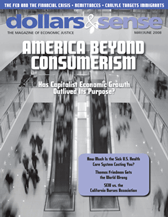
Dear Dr. Dollar:
Who cares if Bear Stearns fails? Or the Carlyle Group? Or Merrill Lynch? Or one of the other big financial companies? They've made their profits. So what's the problem?
—Julia Willebrand, New York, N.Y.
This article is from the May/June 2008 issue of Dollars & Sense: The Magazine of Economic Justice available at http://www.dollarsandsense.org

This article is from the May/June 2008 issue of Dollars & Sense magazine.
Subscribe Now
at a 30% discount.
When Bear Stearns, the large New York investment bank, closed its doors in March, some people lost money. Even with the bailout of Bear Stearns engineered by the Federal Reserve, the stockholders of the company paid dearly.
Of course long-term holders of Bear Stearns stock didn't lose so much relative to what they had invested, perhaps years ago. But they lost a lot relative to what they thought they had one year ago. Then the stock was selling for about seventeen times what they ended up getting when, under the tutelage of the Fed, JPMorgan Chase bought Bear Stearns at $10 a share. Recent buyers of Bear Stearns stock, however, were big losers; if they bought a year ago at $170 a share, they ended up taking losses of 94%. Life is tough.
For more coverage of Bear Stearns, see Larry Peterson's web-only article about the Bear Stearns bailout.
Then there are the employees of Bear Stearns. Hundreds of people are losing their jobs. And right now is not a good time to be looking for work in the financial industry!
But what about the rest of us? It turns out that the rest of us get hurt too when a large financial firm—or, for that matter, any large firm—goes under. We see the bad impacts of a firm's failure most clearly in a small town where a single employer plays a major role. When the firm fails, people lose their jobs. The fall in their incomes means they buy less, and other firms and other workers in the town feel the pinch. The impact spreads.
When large financial firms like Bear Stearns fail, the impacts can be very far reaching. These firms have extensive financial connections to other firms, which in turn are dependent on payments of obligations from the failing firms to meet their own obligations. If firm A fails, it doesn't meet its payments to firm B, which then can't meet is obligations to firm C, and so on. Any one of these firms that is close to the edge can be pushed over it by this failure of payments.
But the problem goes beyond these very tangible connections. The financial industry works on confidence. People loan money and buy stocks and bonds based on their confidence that these investments will pay off—that the firms to which they provide the money will return their money at a profit. When a large financial firm fails, they start to get worried; they lose their confidence. Not only do they fear the consequences of that firm's failure spreading (from A to B to C). They also worry that the same underlying problems that affected that company will affect others and ultimately their investments. Losing confidence, they are reluctant to supply money.
Loss of confidence is especially understandable when the causes of the problems that afflicted Bear Stearns are so well known and widespread. An era of excessively risky investments—with the sub-prime mortgage mess as the most visible part of the crisis—is now readily apparent.
But loans make the world go round. Without ready access to loans, firms are forced to cut back their investments and home-buyers find it more difficult—or more expensive—to obtain credit for their purchases. Even the student loan market is being affected by the current lack of credit—this "credit crunch." How many students from middle- and low-income families will not go to college next fall because they cannot get the funds?
So the rest of us can pay a dear price when a large financial firm fails. This is the rationale that the Fed offered when it stepped in to arrange for Bear Stearns to avoid actual failure. Its obligations will be taken over by JPMorgan Chase. But the takeover affects confidence roughly like a failure.
Even when the threat to the rest of us is real, this doesn't mean there has to be a bailout—or even a partial bailout as took place with Bear Stearns. For example, early this year, the British government nationalized Northern Rock bank when it could not meet its obligations. The government will run the bank, providing extra funds to the extent needed, and, when it is solvent again, will sell it off to private interests. The original stockholders will get money from the sale of the bank, but only after the government gets all of its money back.
Equally important, because the government, operating through the Fed, has to step in when financial firms fail, the government also has to set rules by which those firms operate. Increasingly, regulations have been removed from the financial sector and new sorts of financial firms have been created to avoid existing regulations. But the financial sector is too important, and too volatile, to be left on its own.

